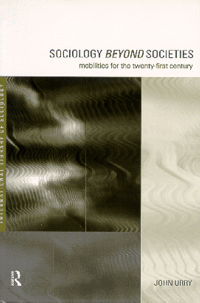

![]()
![]()

Urry begins chapter two with a brilliant discussion of the indispensability of metaphor for thinking sociologically before introducing his own metaphors. (His analysis of visual metaphors in positivist attempts to overcome "mere metaphor" is particularly recommended). While metaphors are always essential, Urry contends that some metaphors are more "scientifically" useful than others. Moving beyond the static and centred conception of "society", the metaphors developed in this book emphasise movement- not just of people, but also of "inhuman" hybrids: information, goods, monies, technologies and "bads". In his book, he is trying to move us from a conception of the "social as society" (which was never much more than a kind of "banal nationalism") into the "social as mobility".
The most important of these mobile metaphors for Urry's project are networks, flows, and scapes. Following Manuel Castells, Urry suggests that thinking in terms of networks provides a number of advantages over older conceptions of structure, which are more centralized and less flexible than networks. These networks "produce complex and enduring connections across space and through time between peoples and things"(34) - so they are not just social networks. Flows of people, money, information, goods, bads, (and so on) move across the social landscape, travelling within and beyond individual "societies". These flows are complex, but not entirely random. They are organized by scapes - those networks "of machines, technologies, organizations, texts and actors that constitute various interconnected nodes along which the flows can be relayed" (35). It can be helpful to think of scapes as geographical, mechanical obstructions and conduits for water- pipes, pumps, river-beds, dams, canals, dykes. While the flow sometimes bursts the conduit, or overcomes the obstruction, the general flow can be mapped according to these features.
In Sociology Beyond Societies, Urry uses these (and other) mobile metaphors to examine a number of different issues (travellings, senses, times, dwellings, citizenships). In Chapter 3, Urry makes a vital contribution to rethinking the social through the mobility of people (walking, trains, planes, and automobiles). His discussion of the central (and under-theorized) role of automobiles and their vast scapes ('infrastructure') in shaping and continuously re-shaping our world is particularly remarkable.
"Dwellings" (chapter 6) also makes an important contribution. Here Urry, creatively appropriates Heidegger's notion of dwelling- expanding it and transforming it to encompass various forms of dwelling in transit. Community, he argues is sometimes, but less and less often a matter of propinquity, ascription and stasis. His examination of the Bund as "sociations...normally joined out of choice and [that] people are free to leave"(143) makes a lot of sense in a world of increasing inter- and intra- "societal" movement.
I find few "sins of commission" in this book (non of them mortal), but I do suspect a number of "sins of omission"- or at least things I would have liked to see in the book. In his discussion of travellings, he provides significant analysis of tourists, travellers and trippers, but for no apparent reason, he opts not to theorize "the various kinds of forced migration which have resulted in at least 140million migrants and refugees worldwide" (50). There is likewise little discussion of the torrential monetary flows across the global financial scapes -surely this is one of the most dramatic and important fluids in a post- societal age. Finally, I was a disappointed to find no sustained discussion of marching troops, scrambling fighter-planes, or launching missiles. Surely such key mobilities should not be left out if one wants to provide a manifesto for sociology in the twenty-first century, because -unfortunately- these mobilities are still likely to look much like they have throughout the twentieth century.
Andrew McKinnon
University of Toronto